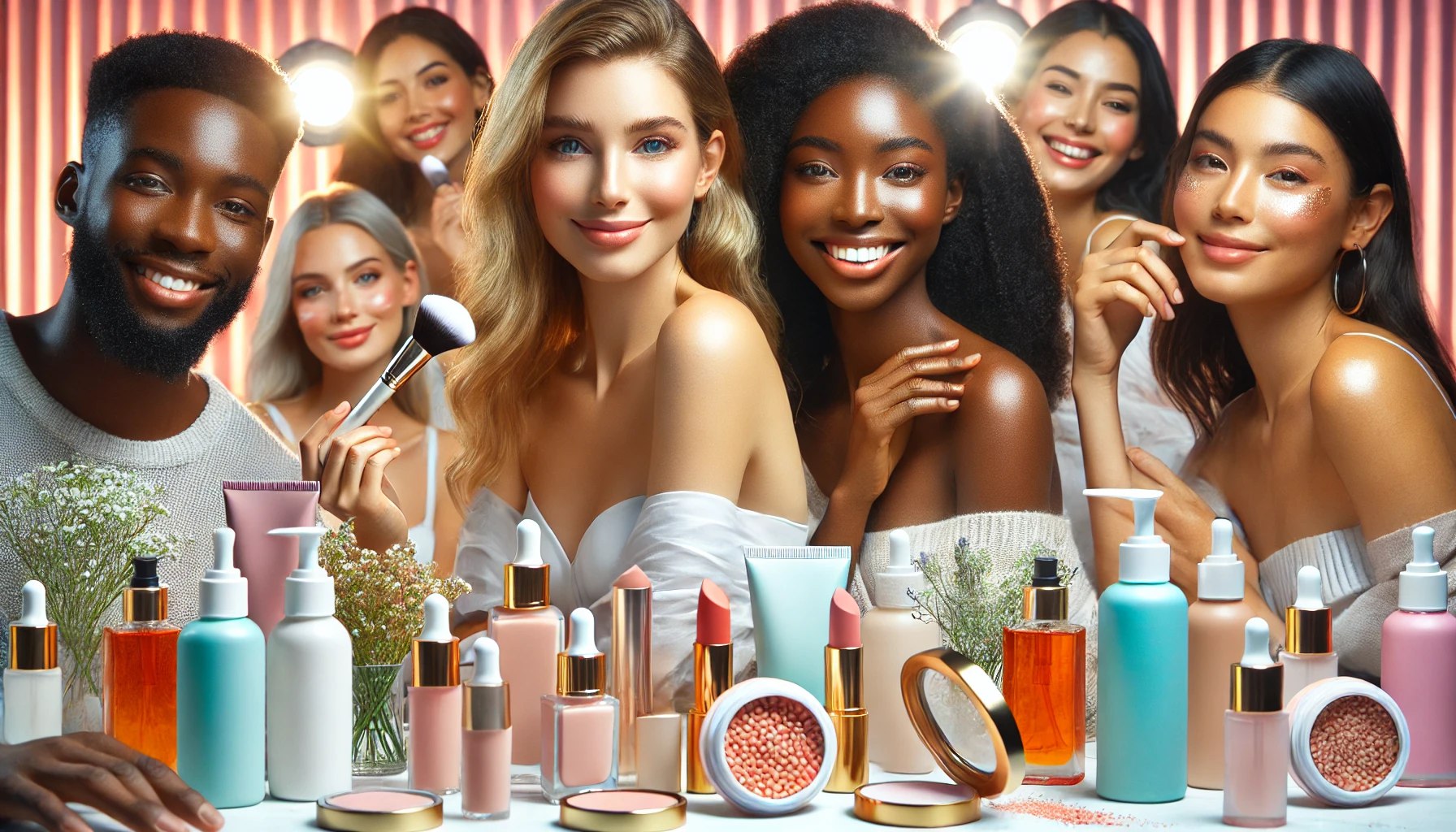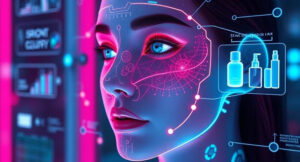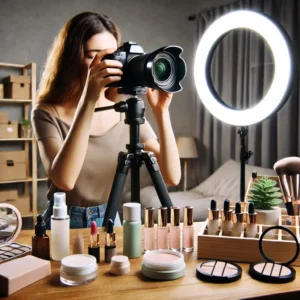Table of Contents
Assess how beauty brands are innovating inclusivity in their latest marketing efforts, driving diversity and setting new standards in the beauty industry.
In recent years, inclusivity has become a defining element in the beauty industry. No longer a niche trend, it’s now at the forefront of marketing strategies for many leading beauty brands. Consumers are increasingly demanding that companies reflect diversity, not just in product offerings but also in their advertisements, campaigns, and overall brand ethos. As we move into 2024, beauty brands are taking innovative approaches to inclusivity, setting new standards and embracing diversity more than ever before.
This article explores how beauty brands are reshaping their marketing efforts to celebrate inclusivity and diversity, driving meaningful change within the industry.
How Inclusive Beauty Marketing is Shaping 2024
The beauty industry is evolving, with inclusivity at the heart of its transformation. Brands like Fenty Beauty, Glossier, and Rare Beauty are spearheading campaigns that celebrate diverse skin tones, body types, and gender identities. This shift reflects a broader movement toward more inclusive representation in all aspects of life.
Fenty Beauty, launched by Rihanna, revolutionized the industry by offering 40 shades of foundation when most brands struggled to offer more than a dozen. This bold move not only highlighted the need for better representation of skin tones but also set a precedent for inclusivity in product development and marketing. Now, more brands are following suit, offering diverse shade ranges and promoting messages of self-love and acceptance.
Brands are also integrating inclusivity into their marketing strategies. By partnering with influencers and models from various backgrounds, beauty companies create campaigns that reflect the real world. These partnerships have driven engagement and resonated with audiences tired of the narrow beauty standards historically promoted by the industry.
Why Diversity Matters in Modern Beauty Campaigns
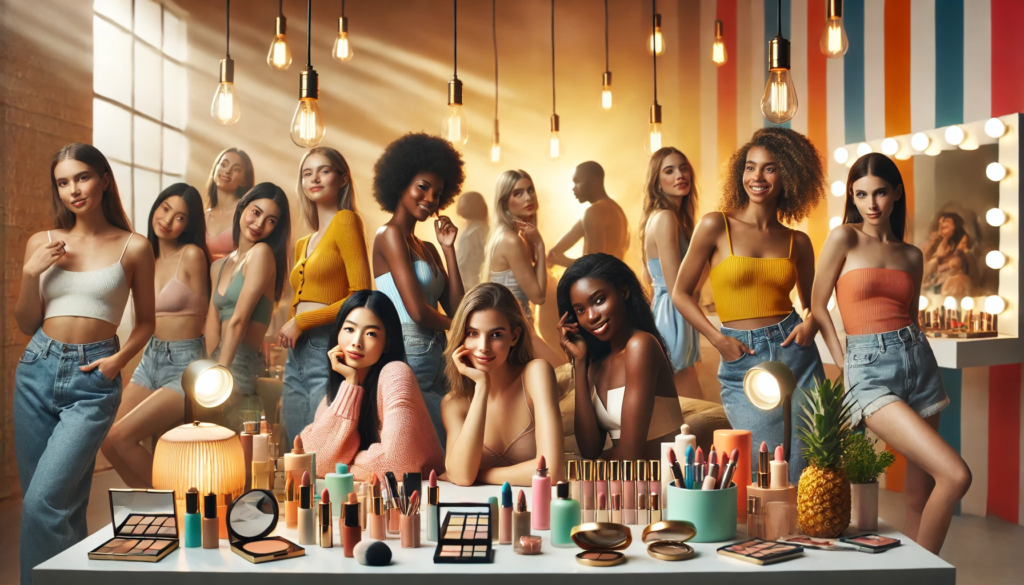
Diversity in beauty marketing isn’t just about appearances—it’s about the message it sends. Campaigns that highlight a range of ethnicities, body types, and gender identities allow consumers to see themselves represented, fostering a deeper emotional connection to the brand. In an era of social media and influencer marketing, authenticity and inclusivity have become the foundation of successful campaigns.
Beauty brands that prioritize diversity are more likely to gain consumer trust and loyalty. In fact, according to a study by Dentsu Group, 75% of Gen Z consumers prefer brands that stand for social causes, including diversity and inclusion. This generation values authenticity, and they expect beauty companies to reflect the broad spectrum of identities they see in their daily lives.
Brands like Sephora and Ulta have committed to inclusive marketing efforts, showcasing models and influencers from all walks of life. Sephora’s “We Belong to Something Beautiful” campaign stands as a shining example of how inclusivity can be embedded in a brand’s core values, promoting diversity not just in skin color but also in gender and age representation.
Leading Beauty Brands Driving Inclusivity in Their Marketing Strategies
Here’s a closer look at some of the beauty brands leading the way in inclusive marketing:
1. Fenty Beauty
Rihanna’s Fenty Beauty is perhaps the most iconic example of inclusive beauty marketing. From its launch, the brand focused on catering to all skin tones, genders, and ethnicities. Rihanna’s vision of beauty for everyone was quickly embraced, and Fenty Beauty’s marketing strategy emphasized representation across its campaigns.
2. Glossier
Glossier, known for its minimalist approach, has embraced diversity by celebrating real people. Their marketing campaigns feature customers and influencers of all backgrounds, often showcasing them in their natural states—no heavy makeup or unrealistic beauty standards. Glossier’s approach encourages self-expression and confidence, which has resonated with a global audience.
3. Rare Beauty
Founded by Selena Gomez, Rare Beauty has a mission of breaking down unrealistic standards of perfection. With a focus on mental health and inclusivity, the brand has gained praise for its diverse marketing campaigns, which feature models of various skin tones, genders, and abilities. Rare Beauty emphasizes that everyone is “rare” and beautiful in their own unique way.
4. MAC Cosmetics
Long known for its inclusive ethos, MAC Cosmetics continues to be a pioneer in the beauty industry. Their “All Ages, All Races, All Genders” campaign pushed the boundaries of diversity, focusing on creating products for everyone, regardless of age, gender, or skin color. MAC’s dedication to inclusivity extends beyond marketing, influencing its product development and overall brand identity.
5. Sephora
Sephora’s inclusive beauty campaign, “We Belong to Something Beautiful,” focuses on amplifying the voices of underrepresented communities. This campaign not only showcases diverse models and influencers but also supports inclusive beauty initiatives, such as its Accelerate program, which aims to uplift and empower underrepresented entrepreneurs in the beauty space. Read more in our article “Sephora x TikTok: A New Era of Inclusive Branded Content”.
Inclusive Beauty Campaigns to Watch in 2024
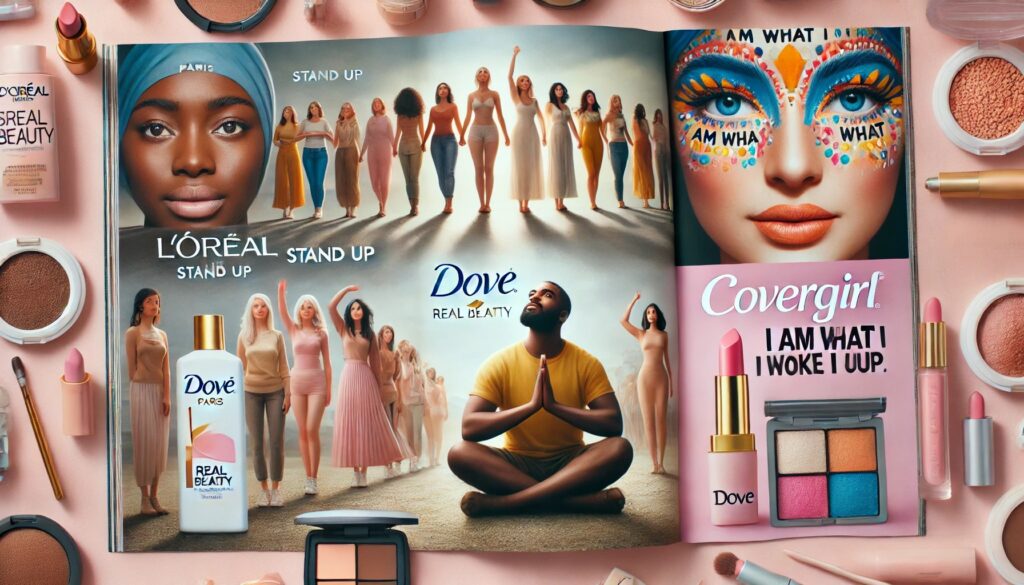
As the beauty industry continues to evolve, there are several marketing campaigns that stand out for their innovative approach to inclusivity:
1. L’Oréal Paris: “Stand Up” Campaign
L’Oréal’s “Stand Up” campaign, launched in partnership with Hollaback!, focuses on promoting inclusivity by encouraging people to intervene in cases of street harassment. Although not directly a beauty campaign, this initiative highlights how beauty brands can use their platforms to support social causes and foster inclusivity.
2. Dove: Real Beauty Campaign
Dove continues its “Real Beauty” campaign with a focus on body positivity and embracing all body types. This campaign has set a precedent for brands to reject unrealistic beauty standards and embrace diversity in size, age, and appearance.
3. CoverGirl: “I Am What I Make Up”
CoverGirl’s “I Am What I Make Up” campaign centers around self-expression and the belief that beauty is for everyone. Featuring models and influencers from diverse backgrounds, the campaign promotes the idea that beauty is about creativity and individuality.
The Future of Inclusivity in Beauty Marketing
Looking ahead, inclusivity in beauty marketing is not just a trend but a necessity. Brands that fail to embrace diversity may find themselves losing relevance in a world where consumers expect representation and authenticity. As we move through 2024, it’s clear that inclusive marketing will continue to play a crucial role in shaping the future of the beauty industry.
Consumers today demand more than just products—they want to support brands that reflect their values. The rise of inclusivity in beauty marketing is a reflection of a larger societal shift toward embracing diversity, and beauty brands must adapt if they want to stay relevant in this changing landscape.
FAQs
- Why is inclusivity important in beauty marketing?
Inclusivity allows consumers to see themselves represented, fostering stronger emotional connections with brands. It also reflects the diverse world we live in, making brands more relatable and authentic. - Which beauty brands are leading the way in inclusive marketing?
Brands like Fenty Beauty, Glossier, Rare Beauty, MAC Cosmetics, and Sephora are pioneers in promoting inclusivity through their campaigns and product offerings. - How has Fenty Beauty impacted the beauty industry?
Fenty Beauty revolutionized the industry by offering a wide range of foundation shades, catering to all skin tones. This inclusive approach set a new standard for beauty brands worldwide. - What are some notable inclusive beauty campaigns of 2024?
Campaigns like Dove’s “Real Beauty,” L’Oréal’s “Stand Up,” and CoverGirl’s “I Am What I Make Up” have made significant strides in promoting inclusivity. - How is the demand for diversity shaping the beauty industry?
The demand for diversity is driving brands to adopt inclusive practices in their marketing, product development, and corporate culture. This shift is reshaping the beauty industry as we know it.
Valeria

